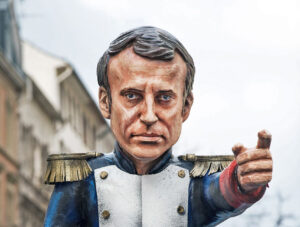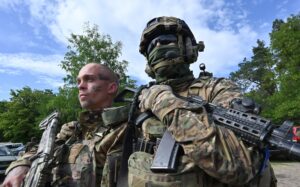As Europe’s leaders anxiously await the results of Ukraine’s long-anticipated counteroffensive, it is significant that Aleksandr Dugin’s latest essay opens by citing Ernst Jünger’s influential 1932 essay The Worker, to call for Russia’s total mobilisation to win the war. Though dismissed by Jünger’s biographer Thomas Nevinin in 1996, back when History had ended, as “pseudoprophecy”, because “democracy has twice within this century triumphed, apparently, over its totalitarian foes,” few writers in 2023 would display such certainty.
If anything, Jünger’s writings, along with those of other thinkers of Germany’s interwar Conservative Revolution, seem to foreshadow the political ferment and geopolitical fault lines of today. As Dugin observes in his rambling and only partly comprehensible essay, published last Friday, “if we turn to Jünger’s idea of total mobilisation in a Heideggerian manner, then we get an existential theory of mobilisation”, as “when death is before us and we don’t run away from it and we don’t turn our backs on it, that’s when we exist authentically. In a sense, this can be described both as a total mobilisation on an existential level and as what I would call an awakening.”
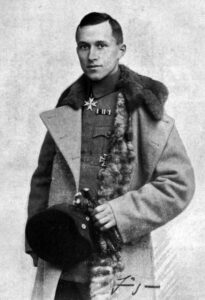
Just as, in The Worker, Junger foresaw the fusion of man and technology in the trenches of the First World War heralding the death of bourgeois liberal values and the birth of a new “age of Titans”, Dugin asserts that Russia’s “Special Military Operation” in Ukraine is “awakening” Russian society, shifting it from a period of “inauthenticity” to one of “authenticity”. In Dugin’s assessment, Russia’s overt enemy, the Ukrainian people, barely count, now being something less than human. Instead, in a wild perversion of Schmitt’s thought, the war has revealed “the very real, absolute Enemy of the human race, to which only theological categories are supposed to be applied” — because “we thought we were fighting enemies in Ukraine, but we ended up in hell”.
That enemy, that hell, is us: “the current postmodern globalist West”, a society “degenerating as humans” where “transgender parades already hardly allow us to understand what kind of species we are dealing with”. Ultimately, “posthumanist formations, i.e., cyborgs, are to follow” because “Western globalist circles are the last transitional state from human being to algae”.
While Dugin’s work is often carried by Russia’s state propaganda channel RT, his influence within Putin’s regime has been vastly overstated. If anything, the apocalyptic rhetoric he applies to the Ukraine war has greater currency in the West, particularly among the American populist Right. Back in 2014, as noted by the Ukrainian scholar of Radical Right intellectual thought Anton Shekhovtsov, now an influential Twitter personality in the war’s online front, Dugin created a narrative which consisted of four major ideas: “first, that Atlanticists brought Nazis to power in Ukraine thus declaring a war on Russia; secondly, that the interim government was a Nazi junta and had no legitimacy; thirdly, that Ukraine did not exist anymore; and finally, that Russia must act decisively to prevent the Atlanticists from establishing control over the entire territory of former Ukraine”.
These arguments are now as wearily familiar to anyone who follows the war on English-language social media as they are to Russians themselves. When Tucker Carlson can describe, as he did last week, Zelenskyy not as the democratically elected leader of a nation fighting invasion, but instead as “sweaty and rat-like, a comedian turned oligarch, a persecutor of Christians, a friend of BlackRock”, he has adopted, consciously or not, a Dugin-like framing of Russia’s aggression against some existential evil. If Dugin remains an outsider of sorts in Russia, then, he has nevertheless helped to shape both the contours of the war in Ukraine itself and international perceptions of it. For a marginal outsider, Dugin certainly seems influential.
In any case, as the editor of CodaStory Natalia Anteleva correctly observes, “the argument about whether or not Putin personally reads Dugin is somewhat irrelevant because Dugin is plenty relevant to the leaders of the Luhansk and Donetsk separatist movements, who consider him a teacher”. As Shekhovtsov notes, Dugin’s previously state-funded Eurasian Youth Union (or ESM) was prominently involved in the initial 2014 stages of the Ukraine war, and “strengthened the pro-Russian separatist movement in Eastern Ukraine, fuelled ethnic and social tensions, launched disinformation actions and declared alternative political centres”. Dugin’s ESM acolytes took up prominent positions in the new separatist republics: Aleksandr Proselkov, leader of the ESM’s cell in Russia’s Southern Federal District, became Deputy Minister of Foreign Affairs for the Donetsk People’s Republic (DNR), before his mysterious death in 2014, while ESM activist Andriy Purhin became the DNR’s first Vice Prime Minister.
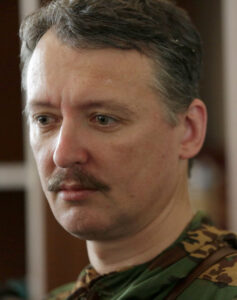
Other fringe political figures on the edges of Dugin’s circle achieved prominence in both stages of the Ukraine war: the Russian adventurer Igor Girkin or “Strelkov” is a familiar name to Ukraine-watchers, first as the DNR’s Minister of Defence, and latterly as a military analyst and harsh critic of Putin’s shambolic prosecution of the current invasion. But for Dugin, Girkin is something else entirely, the mystical embodiment of “the Russian myth”, a “fearless Russian Orthodox Warrior heading to a Sacred War on his own accord” who by seizing Slovyansk “like D’Annunzio in Fiume” appeared on history’s stage as “the ghost of a true Russia” to guide Russia into its glorious Eurasian future.
With his opaque political philosophy merging both the esoteric Traditionalism of René Guénon (whose acolytes include both our own King Charles and, seemingly, Ukraine’s chief of intelligence Kyrylo Budanov) and an interpretation of Germany’s interwar Conservative Revolution which tips more sharply into fascism than the original, Dugin embodies the strange ferment of ideas which attended the fall of the Soviet Union. As the scholar of Traditionalism Mark Sedgwick observes of the philosophy, “in the West, it has generally appealed to intellectuals whose understanding of modernity has led them to disenchantment with it and alienation from it”. This makes them marginal figures in a broader political scene, but “for those with experience of Soviet modernity, however, Traditionalism could very easily seem to present an entirely accurate analysis”. After all, “nowhere was the loss of the sacred more dramatic than in the officially atheist Soviet Union, and nowhere else were the two substitute cults of science and progress more assiduously advanced, and nowhere else was the cult of progress more obviously illusory.”
Sedgwick’s insight is the key to understanding the influence of radical Right-wing, anti-modernist and Conservative Revolutionary thought on both sides in the Ukraine war, lost in the tiresome and intellectually sterile debate over which side contains the greater number of “fascists”. Kept isolated by Communism from the development of the post-war liberalism which still maintains a faltering hold on Western political discourse, as Communism discredited itself, radical intellectuals in the post-Soviet sphere turned their attention to the last great intellectual attempt to transcend liberal modernity, the Conservative Revolution, until recently discredited in the West by Germany’s subsequent, disastrous Nazi interlude.
In this story, Ukraine’s largely Russian-speaking second city of Kharkiv, birthplace of both Ukraine’s nationalist Azov movement and hometown of Dugin’s early patron, the Russian National Bolshevik provocateur Edvard Limonov, plays a significant role. Even now, Kharkiv functions as the organising base for the Azov-linked exiled Russian ultranationalists and neo-Nazis fighting Putin’s invasion through their incursions into Russia’s Belgorod. As the Kharkiv writer Anatoly Voronin observes, the city’s status as an ethnic and cultural borderland between Russia and Ukraine forged an unusual hybrid identity, and a form of nationalism quite distinct from that of western Ukraine, where both Russian and Ukrainian radical Right intellectuals interacted with each other in shaping their worldviews. As Voronin asks: “how do we explain the generally good relations between Dugin and various Ukrainian Right-wingers in the 2000s? No one in ‘Azov’ ever denied the profound influence Dugin had on young [Azov leader] Andriy Biletsky.”
Dugin’s influence, funded by Putin’s government, within the Ukrainian dissident political scene of the 2000s included cooperation with the poet and Right-wing activist Dmytro Korchynsky of the Orthodox fundamentalist Bratsvo party (whose militia is now fighting Russia in the east; as an aside, a young American volunteer with them I met in Kharkiv complained his fellow fighters dragged him to Orthodox mass early every morning). Dugin even found favour with the fascinating, complex Oleksey Arestovych, until recently Zelenskyy’s strategic advisor, but back then a Eurasianist opponent of Ukraine’s relationship with Nato and the West. Dugin’s original ambivalent stance on Ukrainian nationalism allowed for a degree of influence perhaps surprising now, broken only by his sudden, dramatic turn towards denial of Ukraine’s very existence. Nevertheless, though counterintuitive today, fringe Right-wing political ideas then possessed both unusual reach and strange, overlapping ambiguities.
The influence of both Dugin and of the German Conservative Revolution is perhaps best embodied in the fascinating political career of the Azov movement’s intellectual star, the Kharkiv native and “first lady of Ukrainian nationalism” Olena Semenyaka. Described by her professors at Kyiv-Mohyla University as “a brilliant student, reserved, and introverted but committed to her work”, Semenyaka’s PhD thesis — “The Transformation of the Conservative Revolutionary Subject in Ernst Jünger’s Work, from the Worker to Anarch in Ernst Jünger’s Creativity” — revolved around Jünger’s relevance to the new world she saw dawning in the 21st century. As the analyst Adrien Nonjon observes, “Semenyaka rose to popularity in the Duginian Traditionalist movement thanks to her article, ‘Conservative Revolution as Mythological Modernism’, published in volume 4 of Aleksandr Dugin’s anthology, In Search of the Dark Logos. She was invited to speak at the international conference Against the Post-Modern World, which was organised at Lomonosov Moscow State University (MSU) in 2011 by the Tradition Center chaired by Dugin”.
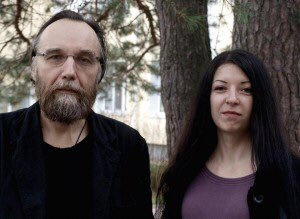
While Semenyaka now dismisses her relationship with Dugin as merely a one-off meeting, her early work, such as 2011’s “Transformation of Ernst Junger’s alternative to the bourgeois individual”, approvingly cites Dugin’s definitions of Conservativism, just as her geopolitical worldview, like Dugin’s, derives from the British political theorist Halford Mackinder’s concept of the World Island, far more influential in Russian Eurasianist thought than it ever was in its homeland. Dugin’s shadow looms over Semenyaka’s writing and speeches, which can often be read as a conscious rejection of her former mentor following the two widely divergent paths each took as a result of Ukraine’s Maidan revolution. Just as Ukrainian and Russian commentators battle to convince international observers that the other side are the real fascists, Dugin and Semenyaka compete to convince the European and American radical Right that the other side are the real liberals. Yet each, despite their two respective nationalist projects being locked in an existential war against each other, share many of the same reference points in the Conservative Revolution, particularly their use of Jünger’s The Worker as a lodestone.
Often dismissed as a Nazi, Semenyaka more accurately occupies a far more interesting intellectual space as a Conservative Revolutionary whose concept of a pan-European political sphere distinct from an Asiatic Russia and a liberal American-led West derives directly from Jünger’s political thought. As Semenyaka writes, “the point of Ernst Jünger, who offered one of the earliest and most insightful descriptions of the coming totalitarian orders in his interwar classic treatise The Worker… is that the difference between the two regimes which rivalled for the planetary domination in the 20th century and the post-war neo-liberal order, in fact, is not so striking.” For Semenyaka, the value of Jünger in understanding the present is unparalleled: “it is his creativity that is considered the brightest example of the alternative of the Enlightenment project of modernisation and is widely known for its futuristic and even forecasting value”.
As she wrote in her intellectual autobiography published on the American White Nationalist website Countercurrents, the Azov movement offers a means to translate her academic interests into real-world politics: “I could say that what I studied in theory, I developed in practice. This is the Third Way, the Conservative Revolution, but revived for today. All of these theorists were also advocates of pan-Europeanism, and that is what our projects are all about.” As she remarks in an explicit rejection of Dugin’s work, “our goal is clear: it is the creation of the sovereign military and political Paneuropean bloc (confederation) which continues the classic tradition of the European third geopolitical way. That’s why Prof. Dugin is wrong by pretending by means of his Fourth Political Theory that the third geopolitical way is no longer possible and that all attempts to restore the European superpower, geopolitical subjectivity and the leading positions in the ‘unipolar’ world are ‘anti-Russian’ encroachments in the service of American imperialism.” For Semenyaka as for Dugin, as she observes in her essay on Black Metal, the goal of the Conservative Revolution is “to cancel not only the era of Enlightenment, but also that of Renaissance and Reformation. In other words, it aims at building the New Middle Ages”.
Mocking Girkin’s marginality, Semenyaka instead posits Azov’s National Corps as the engine of history, the “vanguard of the Ukrainian nationalism of the new generation which offers the alternative both to the West and Putin’s Russian Federation.” In Semenyaka’s assessment, “According to Jünger’s forecast, the titans will reign throughout the entire 21st century, but then the gods will return, casting the titans in the Tartarus again, but also completing the eventual decline of the anthropocentric history which began with WW1.” It is in this process that the Azov movement can play its historical role, she believes: “That’s why, on a global scale, as pompous and surreal as it may sound, we will feel a relief only when we hasten the coming of a new metahistorical aeon.”
When I interviewed Semenyaka back in 2019, she had just published her own translated selection of Jünger’s writing to be distributed among soldiers at the front. At the time, I thought her prediction of a coming great war against Russia, in which the West would be embroiled and in which Ukraine would forge a deeper cultural and defence relationship with Poland and the Baltic states as part of her Intermarium project, was a wild and unlikely fantasy. But the Azov movement, though still politically marginal, has been significantly boosted by Russia’s invasion, in numbers, military power and in its reputation as dogged defenders of the Ukrainian homeland, as during the siege of Mariupol’s Azovstal. Azov offshoots, such as Ukraine’s Third Assault Brigade and Kharkiv’s Kraken Regiment, play prominent roles in the war, and can reasonably hope to trade it for political capital — however the war ends.
Whatever the strange ambiguities of their earlier relationship, Dugin and Ukraine’s nationalist intellectuals like Semenyaka are now bitter opponents, locked in an existential conflict against each other, in a sort of esoteric Rightist shadow war distinct from but embedded within the far greater Ukraine tragedy. When the Russian state accused Azov of assassinating Dugin’s daughter Dariya Dugina — a still unproven claim — it only highlighted the strange intertwining of Russian and Ukrainian radical Right-wing politics. On the one hand, these are wildly obscure intellectual currents on the fringes of Right-wing thought; on the other, Western liberals cheering on the Russian Volunteer Corps’s raids on Belgorod, like American Republicans regurgitating Dugin’s portrayal of Zelenskyy as an incarnation of evil, have each found their own political personas influenced by them, demonstrating the strange ability of fringe politics to shape the wider world.
While Dugin’s apocalyptic worldview is now worryingly indistinguishable from that of the Russian state as a whole, Semenyaka’s, while fascinating, remains marginal in Ukraine. Yet each embodies the unexpected resurgence of esoteric Rightist ideas from the early 20th century in a hypermodern war that looks set to define the contours of modern Europe. Far from obscure 20th century marginalia, Germany’s interwar Conservative Revolution looks more relevant than ever: sometimes, history is written on the fringes.
Disclaimer
Some of the posts we share are controversial and we do not necessarily agree with them in the whole extend. Sometimes we agree with the content or part of it but we do not agree with the narration or language. Nevertheless we find them somehow interesting, valuable and/or informative or we share them, because we strongly believe in freedom of speech, free press and journalism. We strongly encourage you to have a critical approach to all the content, do your own research and analysis to build your own opinion.
We would be glad to have your feedback.
Source: UnHerd Read the original article here: https://unherd.com/

